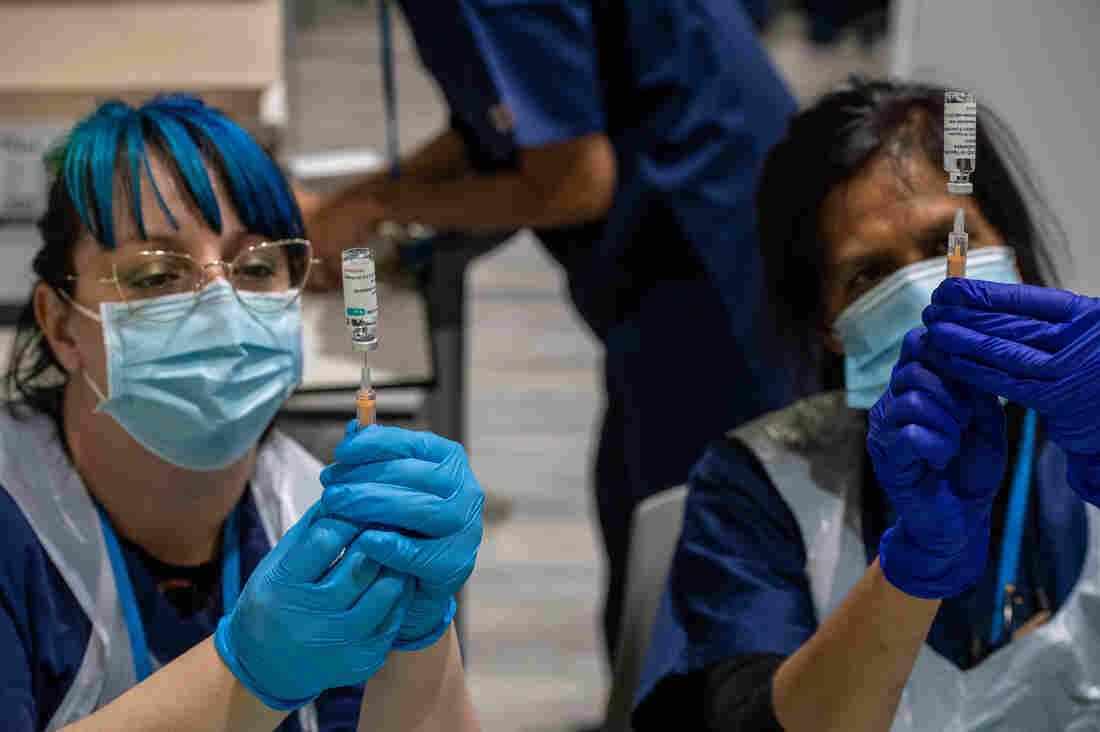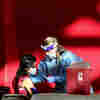U.K. Problem Study Will Expose Balanced Volunteers To The Coronavirus : Shots

Two wellness treatment staff prepare syringes with AstraZeneca’s COVID-19 vaccine in London Monday. A U.K. review will expose volunteers to the coronavirus and could support development of future vaccines.
Chris J Ratcliffe/Getty Photographs
disguise caption
toggle caption
Chris J Ratcliffe/Getty Pictures

Two health and fitness care staff prepare syringes with AstraZeneca’s COVID-19 vaccine in London Monday. A U.K. analyze will expose volunteers to the coronavirus and could support advancement of upcoming vaccines.
Chris J Ratcliffe/Getty Photos
Scientists in England are deliberately exposing volunteers to the coronavirus that brings about COVID-19. The objective is to pace up the growth of new vaccines and treatment options.
But exposing folks to a probably deadly sickness with no specially helpful treatment strikes some as needless, if not unethical.
Human problem experiments differ from other reports of COVID-19 in a really critical regard. “The key variance is the handle,” states Christopher Chiu, an infectious illness researcher at Imperial College London and direct scientist for the challenge analyze.


He claims with a challenge research, you know specifically when a human being was uncovered to the virus, and particularly how much virus they have been uncovered to.
Devoid of understanding these points, you have to hold out till folks are exposed to the virus by chance.
“You will conclusion up possessing to recruit a ton extra persons, give a large amount much more persons your applicant vaccine, before you’ll see a end result,” Chiu suggests.
In fact, it took lots of months and tens of countless numbers of volunteers to present that the Pfizer, Moderna and Johnson & Johnson vaccines labored. A obstacle analyze could, in principle, have been in a position to display that with a portion of that quantity and in considerably considerably less time.
But it does suggest exposing completely healthful individuals to a harmful virus.
Chiu states he and his colleagues are acutely mindful of that possibility, and which is why they only system to include things like selected sorts of people today in their research.
“We know from in excess of a yr of the pandemic now that young healthful grown ups are at very minimal possibility of having severe COVID,” he suggests.
Chiu claims in addition to involving only healthy younger adults, the experiments will be carried out at the Royal Cost-free Healthcare facility in London, a facility with ample expertise caring for COVID-19 patients. Volunteers will be handled at the very first signal of illness, a time when therapies appear to be most powerful.
But finding out only young grownups is a single of the flaws men and women see in obstacle studies to exam the efficacy of an experimental vaccine, for instance.
“The details you get from a problem examine about irrespective of whether that performs is not genuinely going to give you the information and facts you want,” suggests Seema Shah, a law firm and healthcare ethicist at Northwestern College Feinberg Faculty of Drugs.
Shah says it really is essential to know if a vaccine will work in more mature individuals, harmful men and women, or persons from various ethnic backgrounds. You you should not get that information and facts from a obstacle review.
“When this all commenced early in the pandemic there was a person significant purpose for undertaking these problem studies, and that was to accelerate vaccine tests,” Shah suggests.
But now, multiple COVID-19 vaccines have been shown to do the job, so the authentic impetus has handed.
Another difficulty obstacle research should deal with is viral variants. Researchers would have to acquire anew standard facts, this sort of as the minimum amount infectious dose for just about every new viral variant they wanted to review, a time-consuming approach. Continue to, this kind of scientific tests may well be handy for screening vaccines in the foreseeable future.

For instance, if coronavirus circumstances turn out to be considerably less common, it will consider far additional than 30,000 or 40,000 volunteers to tell if a new a new vaccine is drastically much better than the types presently available. And it will make evaluating vaccines head to head considerably less difficult.
“So in those people circumstances a human challenge infection model could be very beneficial,” claims Kanta Subbarao a virologist and director of the Entire world Well being Business Collaborating Centre for Reference and Investigation on Influenza in Melbourne, Australia.
But she’s concerned that not adequate is acknowledged about the hazards of remaining uncovered to SARS-CoV-2, the virus that brings about COVID-19, even for health younger grownups.
“We talked early on about irrespective of whether we ought to even contemplate SARS-CoV-2, and said we would not,” Subbarao suggests. “But we are discovering just one of the prevalent chilly coronaviruses.”
She thinks that perform could offer clues to a universal coronavirus vaccine, one particular that would protect against both of those COVID-19 and the common chilly.
Right now, Imperial College’s Chiu and his colleagues are hoping to determine the least amount of virus it requires to make anyone ill with COVID-19. Just after that, they can flip their awareness to screening new treatments and vaccines.
